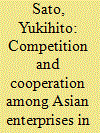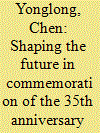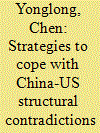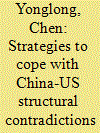|
|
|
Sort Order |
|
|
|
Items / Page
|
|
|
|
|
|
|
| Srl | Item |
| 1 |
ID:
087425


|
|
|
|
|
| Publication |
2009.
|
| Summary/Abstract |
The Asian economy has experienced tremendous changes since the late 1980s, such as the serious stagnation of the Japanese economy, the rise of many non-Japanese Asian firms, particularly in Taiwan and South Korea, and the emergence of China as an economy endowed with abundant low-cost production resources as well as a huge market. This special issue explores how Asian enterprises interact with one another amid these structural changes, with China as the arena. First and most importantly, our studies illustrate many cases of competitive and cooperative relationships among Asian firms, various kinds of cooperation in particular, which reflects the narrowing gaps among Japanese, Taiwanese, and Korean firms. Second, we also demonstrate the evolutionary process of resource/capacity building and strategic choices. Third, mutual trust built up through long-term association plays a crucial role in the collaboration between Japanese and Taiwanese firms. Fourth, although we focus on Asian enterprises, our research also shows that the multinationals from America and Europe continue to be important actors in the regional economy. Fifth, China is both a facilitator of cooperation and a stage providing opportunities for the latecomers to challenge firms from advanced countries
|
|
|
|
|
|
|
|
|
|
|
|
|
|
|
|
| 2 |
ID:
128319


|
|
|
|
|
| Publication |
2013.
|
| Summary/Abstract |
Sino-US relationship is a relationship between the largest developing country and the largest developed country in the world. It is now upgrading to a relationship between a large country on the rise and a large country to maintain the status quo. Owing to the distinctive character, complexity and importance of both sides, Sino-US relationship is in reality becoming a composite partnership integrating interests, responsibilities, competition and cooperation. It is a relationship marching forward on the basis of a new concept of interests and principles. The essence of Sino-US relationship is to actively foster cooperation, appropriately handle competition, energetically control differences and avoid confrontation and conflicts. To shape a new model of major-country relations is the common desire of China and the U.S. The two sides need to further strengthen pragmatic economic cooperation and push forward effective cooperation on regional hot-spot and global issues.
|
|
|
|
|
|
|
|
|
|
|
|
|
|
|
|
| 3 |
ID:
103740


|
|
|
| 4 |
ID:
104017


|
|
|
|
|
| Publication |
2010.
|
| Summary/Abstract |
China-US relationship is as important as any bilateral relationship in the world. Yet it is also very exceptional. It contains not only contradictions, but also base and needs for cooperation. To build a "positive, cooperative and comprehensive" relationship, China and the US need to resolve four categories of structural contradictions: first, structural contradiction in politics stemmed from differences in social systems, values and religions; second, structural contradiction in economy derived from different development modes and disparity in development level; third, contradiction underlain by differences in security concepts and the character of the security forces; fourth, contradiction arising from the fact that, China and the US, distinct as two particular countries with both at particular historical stages, are of different status and playing different roles in this particular international complex. The establishment of a strategic mutual-trust should be placed atop the agenda of the China-US Strategic and Economic Dialogue. Cooperation between China and the US will benefit both countries and the world at large.
|
|
|
|
|
|
|
|
|
|
|
|
|
|
|
|
| 5 |
ID:
165571


|
|
|
|
|
| Summary/Abstract |
The ongoing dialogue between the US and the Taliban has generated lot of interest among strategic analysts in the region and beyond. There are indications that the Taliban are hardening their position as the US appears to be in a haste to pull off an agreement. This essay argues that given the extremely fractious nature of politics within Afghanistan and the prevailing culture of mis-governance, corruption, anarchy and violence, it is important to involve diverse ethnicities, regions and armed groups of all shades including dissenting groups within the Taliban to ensure that the post-Soviet withdrawal scenario of all-against-all does not emerge again, jeopardising prospects of peace and stability in future. At the regional level, countries having stakes in Afghanistan must be involved in a separate conversation to avert the possibility of any of them acting as spoiler. Managing the course of negotiations would involve mature bargaining, efficient and firm signalling from the US, and reinforcing the values that promote human dignity, individual liberty and inclusive democracy through effective advocacy of liberally mediated/interpreted religious and cultural principles that enjoy a greater degree of acceptability in Afghan society.
|
|
|
|
|
|
|
|
|
|
|
|
|
|
|
|
|
|
|
|
|